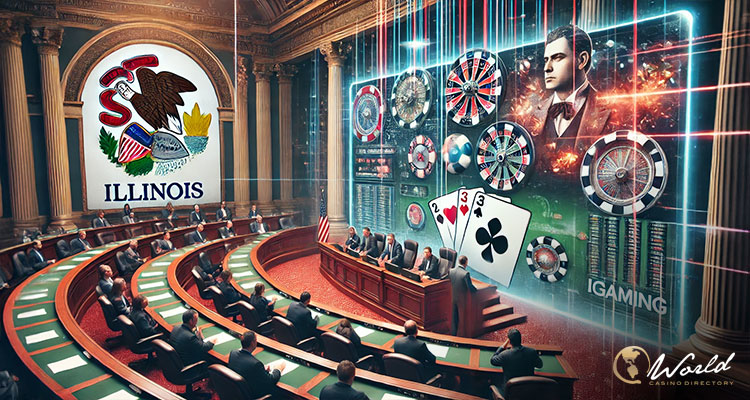Amidst financial challenges, Illinois is poised to embrace the digital gaming era with proposed legislation that could transform its gambling landscape. Lawmakers, led by Senator Cristina Castro and Representative Edgar Gonzalez, have introduced companion bills aimed at establishing the Internet Gaming Act. This legislation seeks to regulate and tax online casinos, positioning the state to capture a new revenue stream while addressing concerns about job security in traditional gambling venues.
The push for digital gaming:
The proposed bills, Senate Bill 1963 and House Bill 3080, are designed to grant the Illinois Gaming Control Board regulatory authority over online casinos. Under these bills, licensed operators could manage up to three digital platforms or “skins,” enhancing the state’s gaming offerings. Notably, the legislation mandates a substantial initial licensing fee of $250,000 and sets a tax rate of 25% on adjusted gross revenue, earmarked for the State Gaming Fund, as reported by SBC Americas.
A unique aspect of these proposals is their commitment to workforce stability. A stipulation in both bills requires that no iGaming license will be renewed if the licensee has reduced its workforce by 25% or more since February 28, 2020, or since the initial licensing. This clause aims to mitigate the potential negative impact on employment at Illinois’ retail casinos, addressing concerns from labor unions and the hospitality sector about the expansion of online gambling.
Illinois’ approach extends beyond financial considerations, with an emphasis on diversity and inclusion within the gaming industry. Licensed online gaming operators would be obligated to submit annual reports detailing their diversity efforts. These reports must outline expenditures with businesses owned by women, minorities, veterans, individuals with disabilities, and small enterprises, and set goals for enhancing diversity in procurement and organizational representation.
Operators are also required to conduct annual public workshops and job fairs focused on supplier diversity, aiming to dismantle barriers to equity within the gaming sector. This initiative reflects Illinois’ public policy to collaborate with businesses committed to diversity and inclusion.
Challenges and opportunities ahead:
Despite the potential benefits, the path to legalizing online gaming in Illinois is fraught with challenges. The established video lottery terminal (VLT) industry, with its powerful lobbying presence, poses a significant hurdle. VLT operators, who manage thousands of slot-like machines in bars, restaurants, and other venues across the state, argue that online casinos could siphon revenue from physical locations, jeopardizing their business model.
Furthermore, the repeated attempts to pass similar legislation highlight the contentious nature of gambling expansion in Illinois. Previous initiatives have stalled due to opposition from various stakeholders, including VLT operators and gaming industry incumbents who fear market cannibalization.
As Illinois grapples with a projected $3 billion budget deficit, the stakes are high. The support from Governor JB Pritzker, who has acknowledged the potential of online gaming as a viable solution for the fiscal shortfall, may provide the necessary momentum for the Internet Gaming Act to advance through the legislative process. With both the economic benefits and the challenges clear, lawmakers and stakeholders will need to navigate complex interests to determine the future of online gaming in Illinois.


